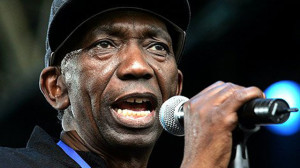It has been 14 years since singer Thomas Mapfumo
went into exile from his native Zimbabwe. And in those 14 years, Zimbabwe has changed dramatically, becoming a wretched symbol of a failed African nation. Unemployment is at least 80 percent. Inflation has skyrocketed for years. And the country has no currency of its own, relying on the U.S. dollar and other foreign money. Ruled over by the autocratic Robert Mugabe, the once-proud nation, which liberated itself of white colonial rule in 1979, is desperate for a fresh beginning. They’re also desperate for Mapfumo, with a collective of Zimbabweans — among them political activists – urging Mapfumo to come home. Some have even asked him to run for office in Zimbabwe, to become an activist politician instead of an activist musician.
“Yes, I’ve been asked to do that,” Mapfumo says in a phone interview from his home in Eugene, Oregon, “but I don’t want to do that.”
Instead, Mapfumo continues to do what he loves best: Performing his unique brand of African music from his base in Oregon, which allows him to tour across the United States and to get as close to Zimbabwe as possible without stepping foot there. In April, he will perform in South Africa, which borders Mapfumo’s landlocked homeland. On Saturday, February 15, Mapfumo returns to the Bay Area, to perform at Berkeley’s Ashkenaz club.
A Thomas Mapfumo concert is a celebration of Zimbabwe’s traditional Shona music culture, where the thumb piano called “mbira” occupies a central role. Mapfumo’s legacy was to marry that culture with instruments like guitar and saxophone, to marry it with lyrics that were both direct and indirect commentaries on Zimbabwe’s leaders and the world at large, and to marry it with a deep, resonant voice (his) that remains one of Africa’s most distinct. Mapfumo called his music Chimurenga, which means “struggle” in the Shona language, and it has long been a fixture in the pantheon of world-music genres.
Known by the affectionate moniker, “The Lion of Zimbabwe,” Mapfumo should be thought of in the same league as Bruce Springsteen and Bono — musicians who are committed to making a difference with their songs. One of Mapfumo’s best-known tunes, 1988’s “Corruption,” slammed the level of “corruption in the society” and the “nothing for nothing” environment that Mapfumo says Mugabe has fostered in Zimbabwe. Many of Mapfumo’s songs continue to be banned on Zimbabwe’s radio stations.



